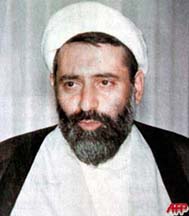Rights

Mohsen Kadivar
Molla or not
Concern over Mohsen Kadivar's arrest, even though he's a clergyman
By Emami
March 11, 1999
The Iranian
Hojatoleslam Mohsen Kadivar was recently
detained at a time when many Iranians were rejoicing over the outcome
of a landmark election in modern Iranian history. No formal charges are
brought against him yet, but it is clear that the losing faction is once
again acting in frustration to make the point that it is still in control
of the key instruments of power.
Kadivar's contributions to a new theology of love and freedom, along
with other prominent Shi'ite thinkers such as Mohammad Mojtahed-e Shabestari,
are widely acknowledged inside Iran. His longstanding scholarship on theories
of state in Shi'ite jurisprudence has been devastating to the monolithic
claims of a small circle within the political elite who justify their absolutist
yearnings for power on the basis of a minority view of government in Shiism.
Drawing on authoritative Shi'ite sources, Kadivar catalogues at least
nine valid interpretations of the idea of velaya-e faqih (trusteeship
of the jurist) among Shi'ite ulama. He has also been an outspoken advocate
of democratic rights and freedoms in Iran and has hence been harassed and
subjected to all kinds of pressures, including being barred from teaching
in some faculties.
News of his detainment have sparked a wave
of protest among university students, journalists, professors, and
a whole range of political organizations and parties founded or revived
in the new atmosphere created by President Khatami's gradually expanding
civil society.
Among Iranians living abroad, however, there does not seem to be a widespread
sense of outrage and any visible activity in defense of him, at least of
the kind rightfully shown in the case of the recent
murders of (secular) activists and intellectuals.
Could this lack of sensitivity be attributed to the penchant for the
dead and the martyrs which is so engrained in our psyches that even after
many years of living in the west one would still react to injustice and
brutality when someone is actually killed? Or is it, perhaps, the anti-religious,
modernist outlook of so many of us that militates against defending a molla
and getting unduly involved in some "in-fighting" that is going
on out there?
What fascinates people like myself who work and teach in Iran is that
the current "civil society" movement is overcoming some of the
nastiest features of our past (leftist as well as Islamic) political orientations,
including the discursive practice of excluding "others" on the
basis of narrow ideological definitions. Thus many of the past us/them-type
dichotomies (modernist/traditionalist, secular/religious, intellectual/clerical
and so on) that prevented or hindered dialogue and cooperation among differing
points of view are consciously being discarded.
Another noteworthy development in the Iranian pro-democracy movement
is a heightened sense of mature action in the context of gradual reforms.
The defunct project of overthrowing the regime, still cherished by the
disciples of some political sects in diaspora, has no appeal even among
younger generation.
Public opinion stands for non-violent, efficacious action to expand
democratic rights and freedoms and to bring about meaningful change. Even
a cursory look at the election results testify to the fact that voters
are not rejecting the regime in toto, but rather those in the machinery
of power who stand against reform and democratic transition.
Kadivar's detention on the orders of a special clerical court may very
well instigate a general debate on the need to reform and unify the judiciary
and to do away with various extant bodies and paralegal procedures in the
judicial system.


![]()